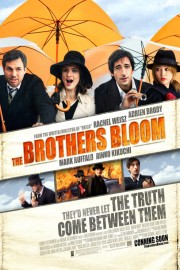The Brothers Bloom
With his first two features, writer-director Rian Johnson is proving himself an eccentric, original voice in American independent cinema. His 2006 flick “Brick” used high school as an unorthodox but effective setting for film noir. Now, with his quirky and endearing “Brothers Bloom,” he’s delivered a thriller with the ease and classic feel of Hitchcock.
Like with Hitch, the music sets the tone for the movie. Though more Nino Rota than Bernard Hermann, Nathan Johnson’s score evokes a timeless quality the film benefits from; we get the sense of a reasonably modern setting, but the costumes and art direction during the opening with the Blooms as kids tell a different story that’s matched in the wry and poetic tone of Ricky Jay’s narration.
Jay’s narration begins the story of the Brothers Bloom, who learned the art of the con early on when Stephen (Mark Ruffalo) concocted a scheme to make his little brother Bloom (Adrian Brody) look good in front of a girl he liked. This continues on for 25 years, con after con, always with Stephen choosing the mark, and Bloom doing the work.
But Bloom’s had his fill, so he goes to Montenegro to retire. But just when he thinks he’s out, Stephen is always back to pull him in again. This time, the mark is a bored rich girl from New Jersey named Penelope (Rachel Weisz), who lives in a mansion with nothing to do but collect hobbies (seen in a tour de force montage for Weisz, who learned them all for the role). Perfect mark, but when Bloom starts to have feelings for her, Stephen’s endgame gets a bit fuzzy.
On the surface, Johnson seems to be channeling David Mamet by way of Wes Anderson, but by the final frames, his own endgame is less one of drama and tension but of making his characters feel alive. It reminded me of Hitch’s “To Catch a Thief” in that way, and while Brody and Weisz are hardly Cary Grant and Grace Kelly romantically, they bring a warmth to these sheltered characters that’s endearing and comically real. True, Johnson still needs to study these masters in terms of pace, but his quirky gallery of characters is impossible not to go along with. Ruffalo has that con man’s glint in his eye as Stephen, but also displays the brotherly love we need to see in him to buy the ending. But the scene-stealer is “Babel’s” Rinko Kikuchi as Bang Bang, whose silence is as droll as her work with explosives is cunning. Kikuchi’s work is a devious microcosm of the dark and witty pleasures Johnson’s film has in store.










